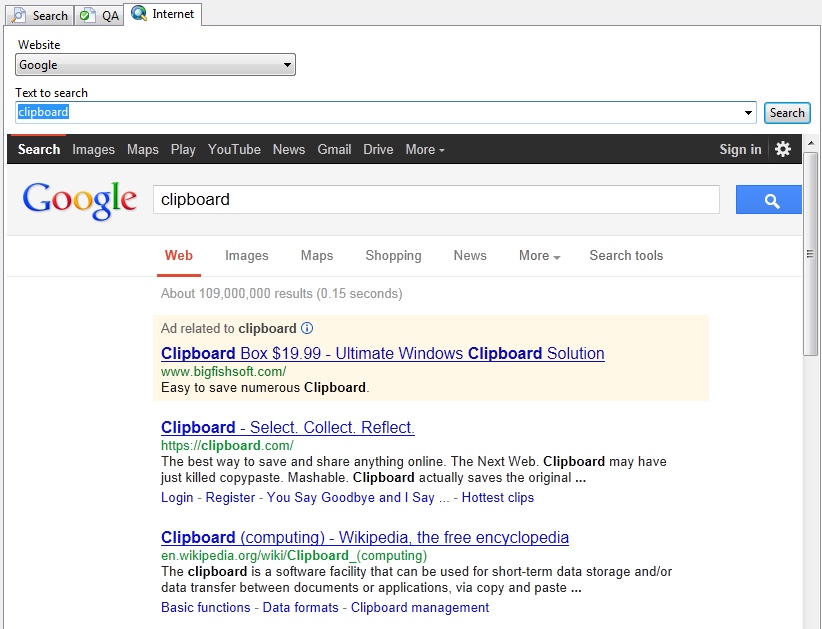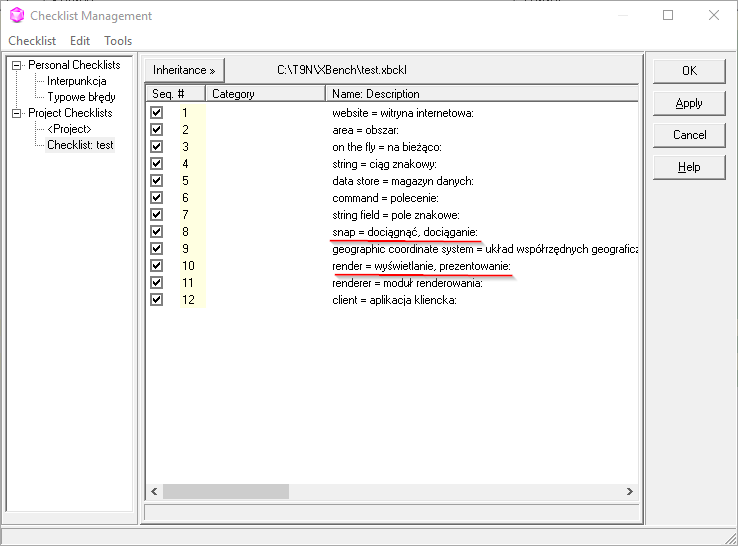

- Xbench personal checklists code#
- Xbench personal checklists free#
Fortunately, this one offers a proper graphical user interface. Rainbow is part of a large framework, mostly composed of command-line tools. Today, from the very same people, let me introduce Okapi Rainbow. I already wrote about how Okapi Olifant was a fantastic TMX editor. Besides the points raised above, he gives a general timeline of when pseudo-localization should be implemented, a few concrete figures to have in mind for text expansion, as well as a few useful examples of character sets necessary for other European languages. Thus, rather than recommending a particular solution, my advice would be to search and find one that matches your exact needs.ĮDIT: Adolfo Gómez-Urda, fellow member of the IGDA LocSIG committee wrote this article for us.
Xbench personal checklists free#
Some are free (CrowdIn’s online tool), others are paid (SDL Passolo), and they all offer different sets of features and supported formats. They will process your strings and turn them into pseudo-localized ones. To help you in the process, there are a number of tools available for you to try.

Make Use Of The Pseudo-Localization Tools Out There It’s a small time investment, but it can make a significant difference one your project reaches the testing stage.
Xbench personal checklists code#
This is also time you will be charged for, and this once per language.īy checking your pseudo-localized code before translation even starts, you should be able to avoid additional costs and delays down the road. If you only find them during multilingual testing, a lot of back-and-forth will be necessary to get everything fixed.
Strings that shouldn’t be translated: If there are strings you DON’T want to be translated, pseudo-localization will help you isolate them more easily. Remember the number one rule of localization: Every localizable string should be editable without touching a line of code Hard-coded strings: Transforming your text for pseudo-localization will make those hard-coded strings stand out. Different character sets: Ensure all the character sets are supported to avoid garbled-character issues. Look for overflows with your pseudo-localized text This is especially true for short strings (menu items, UI, etc.). Text expansion: It is generally recommended to plan for at least 30% of extra space, more if possible, for localized languages. Here are the things you will want to test: The idea is to create a worst-case scenario locale with longer strings, special characters and so on. In other words, it’s about making sure you will be able to implement localized strings without any major trouble, and without having to edit your code. Simply put, pseudo-localization is the process of verifying that your software, app or game is ready for localization. Pseudo-localization is a lesser known-one, although it refers to an important part of the localization process. Translation, localization, internationalization… we are now familiar with these terms. You can also register on Facebook using the following links: It will allow us to have a better idea of the number of attendants we should expect and send you updates. Enter your name address, email, and indicate if you are planning to attend the workshop, the networking party or both. Please use the form below to pre-register. Organizers will be available for any questions.ġ-minute walk from Saiin station (西院駅), Hankyu lineĢh all-you-can-drink + course, details here: Contactįor any questions, please feel free to contact Anthony Teixeira (contact AT ) or Ryosuke Nagao (ryosukenagao AT ) in English or Japanese. Workshop: attendants will be invited to choose a package and translate, individually or in groups. Presentation of the LocJAM, analysis of the workshop games through the game localization process, QA session. Networking dinner: 3,246 yen (tax included, details below) Schedule Narrative by nature, this game is perfect to practice for potential J-E translation contests in the future. Translators working from Japanese will be offered to translate one of last year LocJAM’s winning entries for Grandpa. As you will find out, game localization processes and tactics also apply perfectly to board games.īeing able to address issues related to the game and its format should help translators get a strong start and work more serenely through the rest of the contest. Translators working from English will be offered to translate this year’s game, a board game, a first in the history of LocJAM. Translators will be invited to choose between two packages, depending on their source language: The goal is to give you practical advice so that you can get started right away, with a clear working plan. 
The session will open with a presentation of the game localization process, using both games offered in the workshop as examples.







 0 kommentar(er)
0 kommentar(er)
